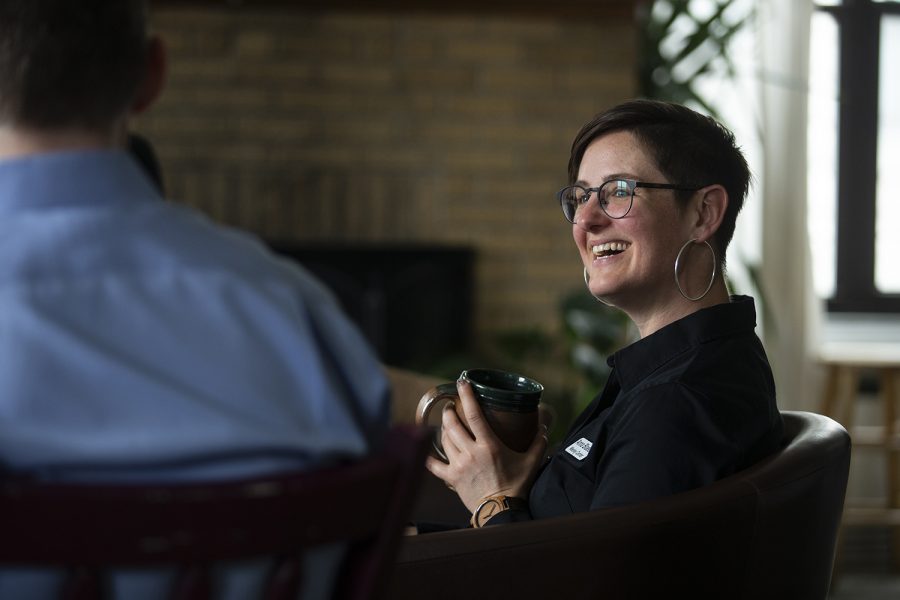Rev. Anna Blaedel listens during a Bible study at the Wesley Center on May 1, 2019. Openly queer, Blaedel has faced formal complaints by the United Methodist Church.
Wesley Center’s openly queer pastor to resign amid church tensions
Rev. Anna Blaedel will resign as director of the UI Wesley Center after spending more than a year under active complaint from the United Methodist Church because of their queer identity. A proposal could also cut most or all of the center’s funding.
May 2, 2019
After years of facing the possibility of being fired because of identity, the University of Iowa Wesley Center’s openly queer ordained minister has resigned after holding the position for five years.
The Wesley Center’s crucial church funding also remains at risk in the wake of the United Methodist Church’s February decision to reinforce its stance against homosexuality, leaving the Iowa City center caught in the cross hairs between its ties to organized religion and the group’s long-held commitment to spirituality through social justice.
Rev. Anna Blaedel, 37, has been actively under complaint from the United Methodist Church for more than a year for being out about their sexuality. Blaedel has received two other formal complaints related to queer issues since 2016.
A current UI Ph.D. student in theology and philosophy, Blaedel will focus the coming year on finishing a dissertation after “too much for too long from the denomination.”
Following their resignation, effective in July, Blaedel will advise the Wesley Center’s Board of Directors on advocating for LGBTQ students and creating a spiritually nourishing space as a part-time consultant. The minister will also continue hosting the center’s weekly tradition of serving homemade food and engaging in discussion at “Tuesday Table.”
“I am still going to be fighting this abusive complaint that’s still ongoing against me,” Blaedel said on Thursday. “I will continue collaborating with queer kin, resisting violence and oppression, and in building movements of collective liberation and spiritual healing.”
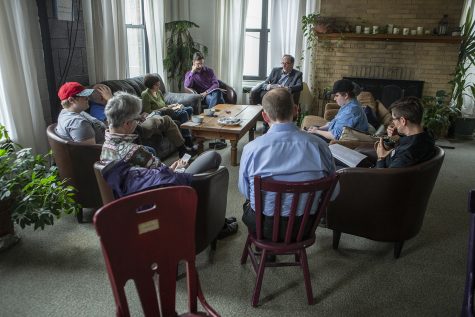
Rev. Anna Blaedel speaks during a Bible study at the Wesley Center on Wednesday, May 1, 2019.
In reflection of the larger national dialogue among Methodists, separating from the church could be on the horizon for the Wesley Center.
Blaedel said the Wesley Board of Directors — which comprises a range of community members, including UI professors and pastors from local churches — will take the year to weigh the decision of remaining affiliated with the Methodist system or transitioning Wesley into a new, independent chapter.
“We are grappling along with a lot of progressive United Methodist churches and individuals with whether or not it’s more faithful to stay in this system and try to keep fighting or to leave before we’re kicked out,” Blaedel said.
The church’s 2019 general conference voted on Feb. 26 to implement the “traditionalist plan,” which reinforced the church’s stance against homosexuality and upheld the current prohibition on LGBTQ clergy such as Blaedel.
Although the church has officially held that homosexuality is incompatible with Christian teachings since 1972, the 2019 general-conference decision secured the position and added additional regulations to enforce and penalize LGBTQ clergy or pastors who officiate at same-sex weddings. The decision also strengthened a provision to halt funding for institutions that promote LGBTQ acceptance, such as the Wesley Center. The changes will take effect in January 2020.
“In some ways, everything has changed, and in some ways, nothing has changed,” Blaedel said. “The outcome of [the 2019 general conference] was devastating and yet it also was this moment of truth being revealed.”
The United Methodist Church, which Wesley is affiliated with and funded by, is the nation’s second-largest Christian Protestant denomination. There were nearly 7 million members nationally in 2016, according to statistics from the General Council on Finance and Administration.
As one of Iowa’s only ordained and appointed Methodist ministers living openly in the face of the LGBTQ clergy prohibition for nearly a decade, Blaedel’s journey in faith has been unique.
“I did a lot of wrestling around [the LGBTQ-clergy ban],” Blaedel said. “But I still felt called to ordained ministry and called to be an agent of change within my own tradition.”
Because they had resisted re-closeting at the time, Blaedel didn’t expect to be able to be ordained but felt it was their calling to at least try. Instead, Blaedel was approved through the ordainment process in 2010, although not entirely sure exactly how.
Blaedel received their first complaint in 2016 under the official charge of being a “self-avowed, practicing, homosexual.” The second formal complaint was filed unanimously by supervisors in the eight districts of the Iowa Conference of the United Methodist Church after Blaedel officiated at a friend from seminary’s same-sex wedding in 2017. Officiating at same-sex weddings has been against the rules in the Methodist Church for years.
Both complaints were eventually dismissed, thereby allowing Blaedel to continue with the ministry.
The United Methodist Church’s complaint system handles a variety of offenses by clergy, ranging from child abuse to not abiding to celibacy while single. Once a complaint is submitted, a bishop investigates the allegations against the accused clergy and decides its validity. Complaints the bishop upholds could result in clergy losing ordained status.
The latest complaint on the grounds of Blaedel’s queer identity was filed by a staff writer at the Institute for Religious Democracy on Maundy Thursday in April 2018. The Iowa Conference of the United Methodist Church is still investigating the matter, rendering Blaedel unsure about their future in the church for more than a year.
“I’ve spent more time since June of 2016 under complaint than not under complaint,” Blaedel said. “It’s been really alienating in terms of my relationship with the [Methodist Church] and my colleagues. It has come with a lot of emotional weight of never knowing if I’m going to keep my clergy credentials, my job, my income, my health insurance.”
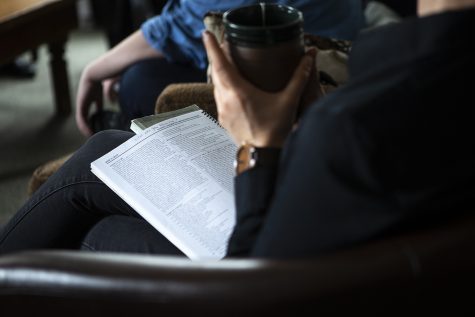
Rev. Anna Blaedel’s notes rest in their lap during a Bible study at the Wesley Center on May 1, 2019.
Despite the church’s position, Blaedel is not the only LGBTQ pastor among the 44,000 clergy in U.S. United Methodism. The United Methodist Queer Clergy Caucus advocates for queer ministers. In 2016, 111 LGBTQ religious leaders also came out in a letter ahead of the 2016 United Methodist general conference, which also addressed the issue of homosexuality.
Wesley was the catalyst in leading Blaedel toward a career in ministry as an undergraduate student at the UI. Blaedel said attending Wesley programming is what led to a re-examination of spirituality and a consideration of a future in the Methodist religion.
RELATED: United Methodist Church faces backlash from local congregations
“I thought that I had wanted to leave religiosity behind — by then, I was out as queer and was pretty frustrated with the [Methodist Church] and organized religion,” Blaedel said. “But I encountered these amazing humans here who were encouraging me to stay curious and to not accept too easy, superficial answers.”
After the UI, Blaedel attended the Pacific School of Religion in Berkeley, California, which specializes in a progressive, social justice-based approach to seminary.
Blaedel felt called back to serve at Wesley, having worked as the director and minister since 2014 Wesley is one of many Methodist campus ministries located at universities across the nation.
For the past five years, Blaedel has assisted students in finding the intersection between spirituality and social justice. They have led the religious student organization with the hope of creating an inclusive, healing space open to diverse dialogue.
“[Assisting with spiritual formation] means a lot of meeting students one-on-one for coffee or tea when they’re asking some of those big questions about the sacred, the divine, and often wrestling with religious upbringing and wanting to find a way to claim spirituality and religiosity in their own way,” Blaedel said.
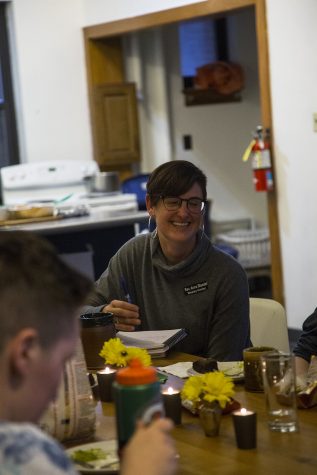
Rev. Anna Blaedel leads Tuesday Table at the Wesley Center on April 30, 2019.
Religion has been an alienating experience for many of the students at Wesley, Blaedel said, often because of their LGBTQ identity or feminist perspectives.
Instead, the center offers an inclusive environment with weekly community meals, discussions, and Bible studies. The students come from a range of religious backgrounds, from United Methodism to agnosticism to Judaism, Blaedel said.
“I think we operate from this deep belief that adherence to a particular belief system isn’t what it’s about,” Blaedel said. “It’s about finding what your belief system is, cultivating the spiritual practices, and nurturing those values of justice, of compassion, of care, of the work of ‘tikkun olam’ — of healing the broken world. And we need to be doing that work together.”
UI senior EJ Jordan-Wood said Wesley was a community at a time of struggling with questioning gender and sexual identity. Seeing Blaedel as a rare, out, proud, queer person in religion has been meaningful representation, Jordan-Wood said.
“It’s frustrating what the [Methodist] denomination is doing but I also had seen it coming for a long time, and so I’ve really separated my spirituality from organized religion in general,” Jordan-Wood said. “I know when it’s good and safe to tap back into the Methodist community and when it’s good to kind of come back out of it.”
UI junior Zoe Swinton, a frequent Wesley attendee, said she has witnessed firsthand how the general-conference decision in favor of the traditionalist plan has affected people she cares for in the Methodist faith. Particularly, she said, she’s seen her father, a Methodist pastor, and Blaedel grapple with the decision to stay ordained or leave the church.
Swinton describes United Methodism as still “deeply intertwined” in her life. She dove into involvement at Wesley after Blaedel’s invitation.
“I realized I was growing in spirituality but also just good, introspective, evaluative thought,” Swinton said. “Good conversation just hadn’t been part of my college experience thus far, and I think that I felt safe discussing the concepts and the ideas that we do discuss.”
The debate between LGBTQ rights and Christian teachings on the UI campus is not an issue unique to United Methodism. The Business Leaders in Christ lawsuit brought up similar questions of religious freedom and discrimination.
A federal court ruled in February that the UI illegally discriminated against faith-based group Business Leaders in Christ for revoking its status as a registered student organization after the group barred a gay student from taking on a leadership role. Business Leaders had a policy that its student leaders must abide by its faith statement, which the court ruled universities cannot use as grounds to revoke a student organization’s status.
RELATED: Court rules UI discriminated against student group
In response to the ruling, Blaedel said, part of the reason behind becoming a member of clergy is to work with groups such as Business Leaders so exclusion and lawsuits can be avoided.
“We’ve grappled at the Wesley Center with what the expectations are for student leaders,” Blaedel said. “We are a religious and spiritual community. But we find it really important to not have litmus tests for student leaders and so particularly to participate, we don’t have a requirement that students have a particular belief system.”
However, Wesley as UI students know it is at risk of losing the funding that keeps its doors open. Blaedel said nearly all of the center’s funding comes from the church, which would be cut off completely if the center separates itself from the church because of its policies on LGBTQ issues. Blaedel said the center generally receives approximately $140,000 from the church as well as funds from private donors. As a religious institution, it doesn’t receive UI funding.
The center has already faced potential defunding for years because of its clear LGBTQ-friendly position, Blaedel said. There is a funding provision in the United Methodist Church, which was strengthened at general conference, that says United Methodist funds can not be used to “promote the acceptance of homosexuality.”
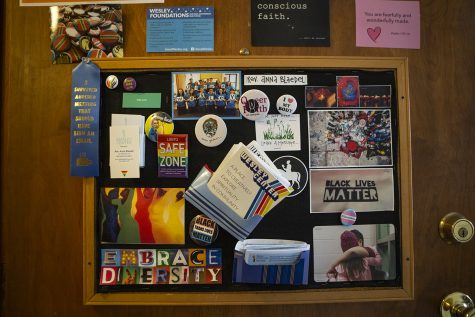
The pegboard outside Rev. Anna Blaedel’s office is seen at the Wesley Center on May 1, 2019.
“There have been churches and pastors and folks who have been working for a long time to try to defund the Wesley Center because of our commitment to LGBTQ justice and intersectional justice,” Blaedel said.
Originally, there was a proposal to cut most or all of the Wesley funds by June, Blaedel said. The deadline has now been extended to around December. Because of pushback, the center might still receive some funds but not enough to sustain the organization.
The Iowa Conference of the United Methodist Church could choose to stop sending funding to Wesley, Blaedel said, and at that point, the center would have less than a month of resources secured.
Wesley is working to secure external sources of funding as a potential solution, Blaedel said, but the financial future of the organization remains unknown.
For UI students such as sophomore Zee Linn, the center’s closing could mean losing a community. Linn, who is an international student from China and regularly attends Wesley meetings, has had trouble fitting into more traditional Christian spaces as someone who identifies as bisexual and has found a place at Wesley.
“So pretty much if you are Chinese, church is a place that you socialize with others, which is not fine for me because of my sexuality more so because it goes against traditional ideology,” she said. “I’m pretty much just hiding myself. But I can always come here and be with people here that I know accept me.”
Many Methodist institutions across the nation support the church’s decision to follow the “traditionalist plan,” while simultaneously weighing the possibility of United Methodist Church division.
Keith Boyette, the president of the Wesleyan Covenant Association, which is made up of traditional United Methodist churches and religious leaders spanning the U.S., said his organization is grateful for the church sticking with its historic position on marriage, ordination standards, and sexual ethics.
“It is appropriate for the church to establish good order, which means requiring people to live out their ministries in accordance with the commitments of the church,” he said.
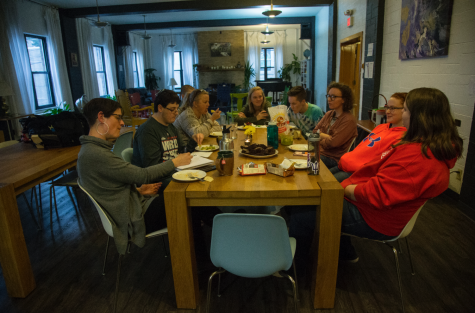
Rev. Anna Blaedel leads Tuesday Table at the Wesley Center on April 30. Students ate dinner, talked about their week, and threw seed pods into the garden.
RELATED: Ministry group works to show Love Works
The Wesleyan Covenant has affirmed that it is open to a multiplication of the Methodist Church, Boyette said, because it might not be possible to hold such contrasting beliefs on LGBTQ compatibility with Christian teachings and remain united as one religious body.
“It’s very clear that there are irreconcilable differences between the two sides,” he said. “The fact that the matter continues to be brought up indicates those divergent positions are going to continue to be in conflict.”
Rev. Barrie Tritle, the pastor of the First United Methodist Church in Iowa City, said the general-conference decision has affected every United Methodist; the members of his church hold opinions on both sides of the fence.
“The [United Methodist Church] is struggling to figure out its future, and people are struggling to figure out their place in that future,” he said.
The Iowa City First United Methodist Church found its place by voting around a year ago to join a network of more than 1,000 Methodist churches and organizations, including the Wesley Center, that support the inclusion of LGBTQ people.
“Our church is committed to having Wesley ministry in Iowa City and we want it to continue — period,” Tritle said.
